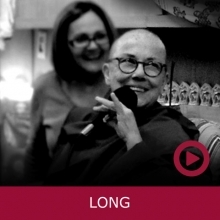Q & A with Robina
17 June, 2024
We don’t know who anyone is, so don’t judge
QUESTION
Dear Venerable,
I hope that you are well.
I know that sometimes my mind has a tendency to kind of lean toward being distrustful, so I'm working on that.
There has been a couple of times in the last year or so when I have heard a teacher, whom I look to with respect, state that he has done DMT several times recently, which is a super powerful mind-altering drug.
If you were to drive a car there's certain rules you have to stick by. Just as when you take robes there's certain rules one must stick by. I am open to seeing things differently and will continue checking up.
Much love,
E
ANSWER
Good to hear from you, E.
When we understand that 1. bodhisattvas spend their lives manifesting in all sorts of forms to connect with sentient beings and to perfect their virtues on their path to enlightenment; and 2. If we’re not clairvoyant we can’t tell who a bodhisattva is, then we’ll develop the view, as the lamas put it, “that we don’t know who anyone is, so don’t judge.”
With this view, the entire world appears differently. We’ll see things like bad behavior and good behavior: they’re facts. But because we can’t see their minds, we’ll leave it there and not judge.
So, assuming this person is a monk and he tells people that he has taken a drug, which you’re assuming breaks one of his vows, and assuming you’ve actually decided he is one of your lamas, then you need to see his actions as a teaching for you.
If you haven’t decided he is one of your lamas, then you should be cautious.
If he’s not a monk, and he doesn’t have a vow in relation to intoxicants, then I can’t see a problem.
R
Robina’s Blog
20 June, 2024
Angry thoughts arising in the mind is not necessarily “being angry”
Part of the process of becoming conscious inevitably means we're going to see the rubbish in our head more clearly. All these negative thoughts – the worries, the anxiety, the anger, the fears – loom large, and they fill our head.
The tragedy is we overexaggerate these negative thoughts. The worst mistake we make is that we believe what they’re saying, especially when they’re about ourself: “I’m not good; I can’t do this,” whatever: we just assume because the thoughts arose that they’re true.
And we totally, totally forget about all our good qualities; we don't pay attention to them. The good ones are quietly sitting there, but we don't even focus on them. It's the irony of ego.
Even in the texts, when they talk about developing single-pointed concentration – this meditation technique that's been around for three thousand years, described in terms of nine stages of development – they say that a sign of success at the first of the nine stages is that we think our mind is getting worse.
It’s like going to the gym. After the first time, you come home and you can't believe the pain: you have discovered muscles you never knew you had! But you don't go rushing off to the doctor, “Oh, I'm in so much pain!” No! Because you know the pain is a good sign. It’s the same with our mind.
You’re seeing your mind because you're training yourself, you're pushing, you're moving forward – just like at the gym. We've got to have the courage to realize this because so often what goes on in our mind is just all the ancient habitual thinking coming to the surface.
We know that from the second we wake up in the morning until the second we go to sleep, we don't have to decide, “I think I'll think something. What’ll I think about now?” We don't think that. The thoughts come flooding in, uninvited, and they mainly seem to be the I-based ones, the neurotic ones: the old ancient stuff, like a big soup, all mixed together.
Of course, we're terrified of the negative thoughts, especially if we have a sincere wish to be ethical and kind, to be a good person; then we get very distressed and start thinking, “Oh, I'm being so negative.”
No, there's a difference. You've got to see there's a difference between having negative thoughts and being negative.
Let’s say, for example, I call up my friend, and I'm in tears, and I'm as mad as hell at my boyfriend, and I say that he’s being mean and ugly. And he might actually be mean and ugly. He's harming me and I'm angry – I’m so angry – and I'm shouting and yelling: “He did this and he did that and I hate him.” And my friend agrees with me: “Yeah, Robina, how can you put up with that creepy guy?”
In other words, that's me being angry. I’m buying into these thoughts, totally believing my story is true: I believe my boyfriend is a creep, and I think I'm right to be angry. That's called “being angry.”
Now, let's say I've decided to work on myself in this relationship with my boyfriend, and I go to see my friend, and I’m crying and I talk about what’s going on. But this is different. I’m trying to understand my anger, to work with it, the pain, the hurt, so I can understand my mind better so I can fix it. That's not called “being angry.” It’s quite different. As Lama Zopa Rinpoche says, the dirt has to come out. It’s good!
So we shouldn't be afraid of what comes up in our minds. But we are: we are terrified, especially if we're trying to be good girls; we're terrified of all the naughty thoughts, so we want to push them all away, or we think, “I'm so bad, look at me,” you know? No, it's just old stuff coming to the surface.
So, what to do with them? One crucial practice is to step away from the thoughts, to have the virtuous part of us observing the angry, crazy thoughts, observing the anxiety, observing the worries and the fears, and not buying into them: not believing that these conceptual stories are true. This takes time. It also takes courage.
The other practice is to hear all the crazies in our head and then to consciously say positive thoughts: use your wisdom to argue with the negative thoughts. I remember one person heard about this and said, “Oh, that's a revelation. I never thought of that.” That’s because we're so obsessed with the negative, we keep trying to control them, to calm them down, to push them away – it’s exhausting!
We're sort of constantly dealing with the negative, but we're forgetting all the positive ones are sitting there. We just have to bring them up and say positive thoughts. This sounds so silly to us almost, but our mind is ours, right? I can decide to think positive thoughts!
We have so many good qualities: we just have to recall them, consciously. We need a balanced picture of ourselves.
The more we can recognize all the goodness in us, the better: the wish to be good, the wish to practice: this is stupendous. On this planet, it is rare to find people who consciously want to become better people.
So feel very happy that you've got that aspiration to become a better person. That's pretty incredible. You should be weeping in happiness for yourself that that's one of your tendencies. Pay attention to thattendency – not just the negative ones.
Bodhichitta Trust projects
Lawudo improvements projects
Helping to Improve the Living Conditions & Infrastructure at Lawudo Retreat Centre, Solu Khumbu, Nepal
Lawudo Trek
A Himalayan adventure & retreat with Ven. Robina that raises funds for Lawudo Gompa, Lama Zopa Rinpoche's retreat center in the Solu Khumba region of Nepal.
Devotion CD
A modern rendition of traditional Tibetan Buddhist prayers, arranged and performed by Ven. Robina and sound artist Yantra de Vilder.
Chasing Buddha Film
The award-winning documentary about Ven. Robina by her nephew, Amiel Courtin-Wilson, the internationally acclaimed Australian filmmaker.
Tsa-Tsa Project
In 2004 Lama Zopa Rinpoche advised Ven. Robina to make 700,000 tsa-tsas: 350,000 of Buddha Mitrugpa, and 350,000 of Lama Tsong Khapa.
Alison harr memorial fund
Alison Harr was a student of Ven. Robina’s who died tragically on June 1, 2013 in San Francisco, due to complications from a car accident.
Cocktail party-auctions
Since 2009, using commerce, kindness, and generosity to raise funds to support FPMT & Bodhichitta Trust projects.



